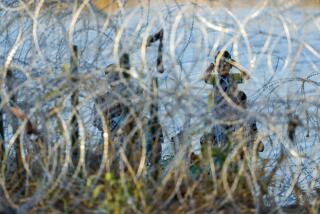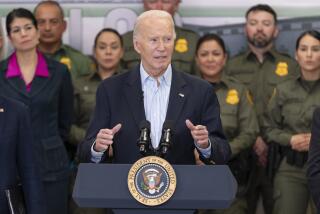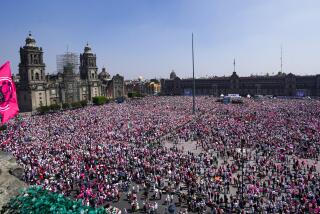Mexico moves to curb drug crime wave
Facing wide public indignation over Mexico’s crime epidemic, President Felipe Calderon on Thursday proposed new steps to fight kidnapping and other violent offenses.
He called for anti-abduction squads, special high-security prisons with separate areas for kidnappers, closer tracking of cellphones and more aid for local authorities.
Calderon summoned governors and police officials from across Mexico to chart a way out of a crisis that has dominated the news and put the nation’s leaders on the defensive.
Government officials, representing all three main political parties, and activists filled an ornate hall in the National Palace with resolute-sounding talk that was often long on generalities.
The gathering, formally known as the National Public Safety Council, endorsed Calderon’s proposals, which carried target dates for completion and calls for watchdog panels to monitor progress.
Calderon said a “cancer of criminality” developed in Mexico over decades of impunity, official corruption and societal neglect.
“This is not about looking to the past to find those to blame for our current ills,” he said. “The reality is we are all to blame.”
The crime issue has dominated the Mexican agenda since the killing this month of a 14-year-old kidnapping victim, Fernando Marti. The kidnapping, which appeared to involve at least two Mexico City police officers, tapped deep resentment over impunity and corruption.
The boy’s father, Alejandro Marti, a wealthy businessman, fought back tears as he urged policymakers at the forum to make substantive changes and said they should quit if they were unable. “Today is our opportunity,” he said.
Activists plan a candlelight march to protest rising crime next week in the capital and other cities. New polls show wide support for tougher criminal sentences, including the long-unused death penalty, formally barred three years ago.
The crime issue has touched off political jousting months before next year’s midterm congressional elections.
Calderon, a conservative with the National Action Party, has traded jabs with the leftist mayor of Mexico City, Marcelo Ebrard, over whose government was more to blame for the fatal outcome in the Marti case.
The Institutional Revolutionary Party, or PRI, which ruled Mexico for seven decades, has stepped up its criticism of Calderon’s crime policies. Manlio Fabio Beltrones, a PRI senator, this week attacked the strategy as simplistic and ineffective.
Calderon has urged rivals not to turn crime into a partisan issue. Since the Marti case, he has urged Congress to stiffen punishments for convicted kidnappers to include possible life sentences.
The president said he hoped that the crime summit would improve coordination between federal authorities and state and local officials who have jurisdiction over many serious offenses, including homicides and most kidnappings.
But many Mexican commentators had dismissed the gathering as an exercise in damage control.
Calderon has made the crackdown against drug traffickers and organized crime a centerpiece of his 20-month-old administration, sending 40,000 troops and 5,000 federal agents into the streets.
That campaign has yielded arrests of some important traffickers and significant drug seizures. But it has also resulted in frightening violence across much of the country as drug gangs fight government forces and battle one another for control of smuggling routes.
At least 2,500 people have been killed in drug-related violence this year, according to unofficial tallies by the Mexican media.
The violence continued Thursday, with the deaths of several more police officers reported around the country.
Authorities said they had discovered the bodies of two men bearing federal police identificationon a highway outside Mexico City. The body of a third man, without identification, was found nearby.
Two state police and, separately, a federal officer were reported dead in the western state of Jalisco. In the central state of Aguascalientes, a police commander was shot dead on a highway.
Cecilia Sánchez in The Times’ Mexico City Bureau contributed to this report.
More to Read
Start your day right
Sign up for Essential California for news, features and recommendations from the L.A. Times and beyond in your inbox six days a week.
You may occasionally receive promotional content from the Los Angeles Times.






